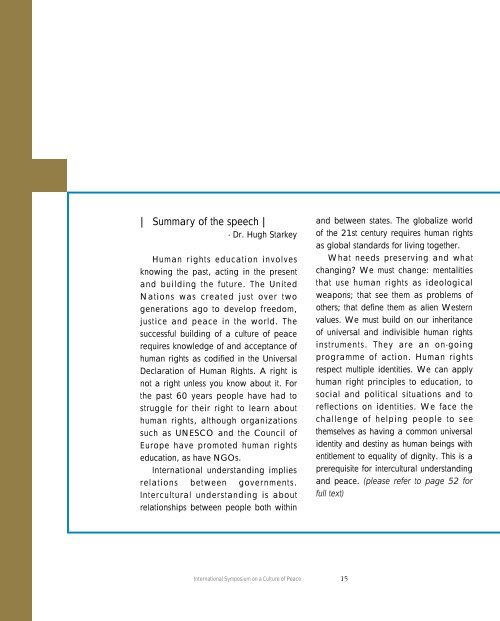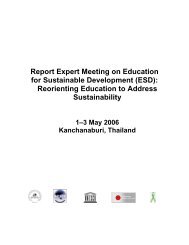- Page 1 and 2: Asia-Pacific Centre of Education fo
- Page 3 and 4: Asia-Pacific Centre of Education fo
- Page 6 and 7: 6 Intercultural Understanding and H
- Page 8 and 9: ▲ During the Round Table Discussi
- Page 10 and 11: 10 Intercultural Understanding and
- Page 12 and 13: ◀ Director General Byong-Hyun Lee
- Page 16 and 17: 4. Plenary Session I: Intercultural
- Page 18 and 19: ▲ Dr. Werner Wintersteiner The pl
- Page 20 and 21: ▲ Mr. Georges Tsai Dr. Werner Win
- Page 22 and 23: Discussion on the session presentat
- Page 24 and 25: 6. Plenary Session II: Human Rights
- Page 26 and 27: The theme speaker is Dr. Toh Swee-h
- Page 28 and 29: ▲ Dr. Aasulv Lande The last prese
- Page 30 and 31: Korea, the situation is different w
- Page 32 and 33: 7. Plenary Session III: Culture Sen
- Page 34 and 35: ▲ Dr. Young-Sun Chung The theme s
- Page 36 and 37: The last presenter is Dr. Kenneth S
- Page 38 and 39: 8. Plenary Session IV: Migration vi
- Page 40 and 41: The theme speaker is Dr. Piyasiri W
- Page 42 and 43: ▲ Mr. William Gois The second pre
- Page 44 and 45: Discussion on the session presentat
- Page 46 and 47: 9. Plenary Session V: Rethinking In
- Page 48 and 49: 3. CSOs should play a substantial r
- Page 50 and 51: efforts to intercultural education
- Page 52 and 53: 11. Presentation papers Keynote Spe
- Page 54 and 55: theme of the symposium is a culture
- Page 56 and 57: ased on the principle of …respect
- Page 58 and 59: Another important development from
- Page 60 and 61: Human rights education involves kno
- Page 62 and 63: References Alliance Isréalite Univ
- Page 64 and 65:
of the Gallery who speaks twice as
- Page 66 and 67:
These few considerations should be
- Page 68 and 69:
differences which are not simply co
- Page 70 and 71:
they wished to focus in seminar III
- Page 72 and 73:
(multilingual) trainers supported t
- Page 74 and 75:
the personal one. - In seminar III
- Page 76 and 77:
4. Conclusion - It was crucial for
- Page 78 and 79:
Education for Peace: Illusion or Es
- Page 80 and 81:
field of peace and conflict studies
- Page 82 and 83:
Special Session Arts Approaches to
- Page 84 and 85:
84 Intercultural Understanding and
- Page 86 and 87:
86 Intercultural Understanding and
- Page 88 and 89:
88 Intercultural Understanding and
- Page 90 and 91:
90 Intercultural Understanding and
- Page 92 and 93:
92 Intercultural Understanding and
- Page 94 and 95:
94 Intercultural Understanding and
- Page 96 and 97:
96 Intercultural Understanding and
- Page 98 and 99:
98 Intercultural Understanding and
- Page 100 and 101:
100 Intercultural Understanding and
- Page 102 and 103:
102 Intercultural Understanding and
- Page 104 and 105:
Nirvana. The Vajrayna or "Diamond V
- Page 106 and 107:
Bush’first reaction of the incide
- Page 108 and 109:
A brief history of human rights Hum
- Page 110 and 111:
Indonesia has its own share of huma
- Page 112 and 113:
Human Rights and Buddhist Cultures
- Page 114 and 115:
Survival Buddhism has been threaten
- Page 116 and 117:
Between Tolerance and Dissent: Reli
- Page 118 and 119:
measures, national and internationa
- Page 120 and 121:
freedom of religion, thought and ex
- Page 122 and 123:
especially religious traditions has
- Page 124 and 125:
post-Cold War world, as they were p
- Page 126 and 127:
make some contribution to the press
- Page 128 and 129:
References Amor, A. (2001) ‘The R
- Page 130 and 131:
1 August 2006, from UN Web site: ww
- Page 132 and 133:
meaning if they were upheld at the
- Page 134 and 135:
the degree HRE can be used as an ef
- Page 136 and 137:
Dominant racial and ethnic group me
- Page 138 and 139:
some methods that human rights educ
- Page 140 and 141:
Linking Diverse Peoples’Movements
- Page 142 and 143:
We need to maintain the integrity o
- Page 144 and 145:
Human Rights Education and the Prac
- Page 146 and 147:
146 Intercultural Understanding and
- Page 148 and 149:
148 Intercultural Understanding and
- Page 150 and 151:
150 Intercultural Understanding and
- Page 152 and 153:
152 Intercultural Understanding and
- Page 154 and 155:
Presentation Papers on Session Ⅳ
- Page 156 and 157:
This shows that world’s migrants
- Page 158 and 159:
persons as the missing link or unfi
- Page 160 and 161:
global health workforce is only 3 p
- Page 162 and 163:
discrimination in access to employm
- Page 164 and 165:
as a WTO trade issue, thereby treat
- Page 166 and 167:
across countries, international mig
- Page 168 and 169:
complex issue involving many dimens
- Page 170 and 171:
makers at national and internationa
- Page 172 and 173:
Governments in the region have prov
- Page 174 and 175:
option of not migrating - ‘remain
- Page 176 and 177:
176 Intercultural Understanding and
- Page 178 and 179:
178 Intercultural Understanding and
- Page 180 and 181:
180 Intercultural Understanding and
- Page 182 and 183:
182 Intercultural Understanding and
- Page 184 and 185:
184 Intercultural Understanding and
- Page 186 and 187:
186 Intercultural Understanding and
- Page 188 and 189:
188 Intercultural Understanding and
- Page 190 and 191:
190 Intercultural Understanding and
- Page 192 and 193:
192 Intercultural Understanding and
- Page 194 and 195:
194 Intercultural Understanding and
- Page 196 and 197:
196 Intercultural Understanding and
- Page 198 and 199:
198 Intercultural Understanding and
- Page 200 and 201:
200 Intercultural Understanding and
- Page 202 and 203:
Social and Cultural Integration:Iss
- Page 204 and 205:
204 Intercultural Understanding and
- Page 206 and 207:
206 Intercultural Understanding and
- Page 208 and 209:
208 Intercultural Understanding and
- Page 210 and 211:
210 Intercultural Understanding and
- Page 212 and 213:
212 Intercultural Understanding and
- Page 214 and 215:
214 Intercultural Understanding and
- Page 216 and 217:
216 Intercultural Understanding and
- Page 218 and 219:
How Multinational Corporations Affe
- Page 220 and 221:
Daewoo is the biggest investor, at
- Page 222 and 223:
unacceptable for a long time. The w
- Page 224 and 225:
case, even once they learned about
- Page 226 and 227:
Conclusion: Strategies for Educatio
- Page 228 and 229:
Supporting migrant human rights def
- Page 230 and 231:
work or sexual violence. Migrant wo
- Page 233 and 234:
I. Programme 9:30 - 10:00 Registrat
- Page 235 and 236:
“Human rights and Buddhist Cultur
- Page 237 and 238:
II. Opening, Welcoming and Congratu
- Page 239 and 240:
Here in Korea, the influx of people
- Page 241 and 242:
trying to develop is not just a set
- Page 243 and 244:
One of the most pressing issues we
- Page 245 and 246:
fostering intercultural understandi
- Page 247 and 248:
Indonesia’s education has two mai
- Page 249 and 250:
Group 2. How to strengthen the nati
- Page 251 and 252:
Recommendations for Further Action
- Page 253 and 254:
“de-humanizing”the “other.”
- Page 255 and 256:
Round Table Discussion 2: Guideline
- Page 257 and 258:
Group 2. How to strengthen the nati
- Page 259 and 260:
Group 3. How to reinforce the role
- Page 261 and 262:
Round Table Discussion 3: Guideline
- Page 263 and 264:
Group 2. How can the government edu
- Page 265 and 266:
Group 3. How to reinforce the role
- Page 267 and 268:
The national governments should rat
- Page 269 and 270:
Ms. Pranom Somwong Coordinator, MAP
- Page 271 and 272:
Mr. Dong-Wook Lee Soldier United St
- Page 273 and 274:
Ms. Kimberly Walsh Human Rights Fel
- Page 275:
Mr. Simon Ji-Hong Kim Staff Mobile








